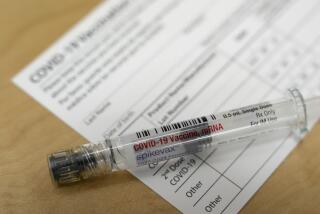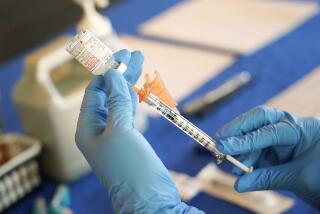Broader boosters
- Share via
BOOSTER shots aren’t just for the elementary school set. Teenagers and adults need them too -- sometimes to protect others as well as themselves.
Cases of whooping cough have hit a 30-year high in California, and many of those affected are people who were immunized during childhood and were thought to be protected for life.
The spread of whooping cough, more formally known as pertussis, in this group may be contributing to an increase in cases among the unvaccinated, particularly infants. In California seven babies died from whooping cough in the last year.
It’s now clear that the immunity provided by the pertussis vaccine wanes over time. “The exact duration of protection is not exactly known,” says Margaret Cortese, a medical epidemiologist with the Centers for Disease Control and Prevention’s National Immunization Program. “We now believe that the immunity provided by the pertussis vaccine rarely lasts longer than 10 years.”
In 2004 adolescents accounted for more than one-third of the 25,000 cases reported in the United States, and adults accounted for another quarter.
But the true number of cases among teenagers and adults is probably even higher than these figures suggest because the disease is often hard to recognize in older people. Health experts estimate that annually as many as 600,000 adults in the U.S. might have pertussis. When adolescents are included, the figure probably rises to between 750,000 and 1 million cases.
Although the disease is generally less severe in teenagers and adults than in infants, it is not harmless for them either. “The most common finding in adolescents and adults with pertussis is prolonged cough,” Cortese says. “Although the average duration of the cough is about two to three months, some patients can cough for as long as eight or nine months.”
Severe coughing spells cause rib fractures in up to 4% of adults and 1% of adolescents known to be infected. Up to 5% of adults and 2% of adolescents with whooping cough develop pneumonia, and as many as one in 20 adults and one in 50 adolescents require hospitalization.
Until recently, nothing could be done to protect people as their immunity to pertussis wore off. Last year, however, the Food and Drug Administration approved two pertussis booster vaccines.
With one injection, adolescents and adults can now get prolonged protection against whooping cough, tetanus and diphtheria. The previous booster vaccines protected against only the latter two diseases.
The CDC’s Advisory Committee on Immunization Practices recommends that adolescents and adults receive one of the new vaccines, Adacel or Boostrix, in lieu of the tetanus-diphtheria vaccine that is typically administered at age 11 or 12 and every 10 years after that. Although final recommendations are still under review, it is anticipated that the current advisory will become official early this year. (Two weeks ago, the American Academy of Pediatrics announced a new pertussis immunization policy for adolescents that is very similar to that of the CDC panel.)
These new recommendations are not simply about protecting teens and adults from whooping cough.
“Pertussis is highly contagious,” Cortese says. “It is easily transmitted from person to person through small particles that are generated when coughing or sneezing.” Because of delays in diagnosis and treatment, adolescents and adults often spread the disease unknowingly to others, such as infants who have not yet been immunized, a group with the highest risk of pertussis-related complications and death.
Pertussis booster immunizations will also prevent prolonged absences from school and work due to illness, research suggests. One recent study performed by researchers at the University of Southern California found that immunizing all adolescents might prevent up to 1.8 million cases of pertussis and save up to $1.6 billion in a decade.
The only downside to the new vaccines is that they seem to ache a bit more than the tetanus and diphtheria vaccines they are intended to replace. It seems a small price to pay to protect your health and potentially the health of others.
Dr. Valerie Ulene is a board-certified specialist in preventive medicine practicing in Los Angeles. She can be reached at themd@att.net. The MD appears the first Monday of each month.
(BEGIN TEXT OF INFOBOX)
*
Who should get a booster shot?
Many doctors are already advising adolescent and adult patients to be reimmunized against pertussis, even though the updated recommendations from the Centers for Disease Control and Prevention are not yet official. To determine whether you need a booster shot, talk to your physician about the suggested guidelines:
Adolescents
* Adolescents who have not yet received a booster immunization against tetanus and diphtheria should be vaccinated with a tetanus-diphtheria-pertussis vaccine (Adacel or Boostrix, both of which have been approved for teenagers).
For adolescents 11 to 18 years old who have already received a booster shot, a single dose of one of these vaccines is encouraged. Although an interval of at least five years between the two shots is recommended, shorter intervals may sometimes be appropriate.
* Adults (ages 19 to 64)
A tetanus-diphtheria-pertussis vaccine (Adacel is approved for adults) should replace the next booster dose of tetanus-diphtheria vaccine. Although booster immunizations are recommended only once every 10 years, the vaccine may be given before the next booster shot is due to protect against pertussis. Though an interval of two years or more since the most recent vaccine is suggested, shorter intervals are sometimes appropriate.
A tetanus-diphtheria-pertussis vaccine is suggested for adults who have or anticipate having close contact with infants less than 12 months old (for example, expectant parents or child-care providers). Ideally the vaccine should be administered at least one month before beginning close contact with an infant.
Women should receive a dose of a tetanus-diphtheria-pertussis vaccine in the immediate post-partum period if they have not previously been immunized. Immunization is also encouraged for any woman who might become pregnant.






